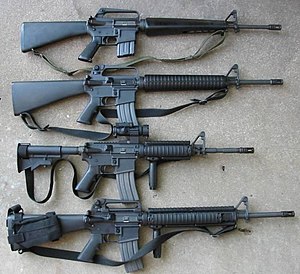M16A1
| Rifle, Caliber 5.56 mm, M16 | |
|---|---|

From top to bottom: M16A1, M16A2, M4A1, M16A4
|
|
| Type | Assault rifle |
| Place of origin | United States |
| Service history | |
| In service | 1964–present |
| Used by | See Users |
| Wars |
|
| Production history | |
| Designer | Eugene Stoner and L. James Sullivan |
| Designed | 1956 |
| Manufacturer | |
| Produced | As the Armalite AR-15 from 1959 to 1964 As the Colt M16 rifle from 1964 to present |
| No. built | ~8 million |
| Variants | See Variants |
| Specifications (M16) | |
| Weight | 7.18 lb (3.26 kg) (unloaded) 8.79 lb (3.99 kg) (loaded) |
| Length | 39.5 in (1,003 mm) |
| Barrel length | 20 in (508 mm) |
|
|
|
| Cartridge | 5.56×45mm NATO |
| Action | Gas-operated, rotating bolt (direct impingement) |
| Rate of fire | 12–15 rounds/min sustained 45–60 rounds/min semi-automatic 700–950 rounds/min cyclic |
| Muzzle velocity | 3,150 ft/s (960 m/s) (M855A1 round) |
| Effective firing range | 550 m (601 yd) (point target) 800 m (875 yd) (area target) |
| Maximum firing range | 3,600 m (3,937 yd) |
| Feed system | 20-round detachable box magazine: 0.211 lb (96 g) empty / 0.738 lb (335 g) full 30-round detachable box magazine: 0.257 lb (117 g) empty / 1.06 lb (480 g) full) Beta C-Mag 100-round double-lobed drum: 2.20 lb (1,000 g) empty / 4.81 lb (2,180 g) full) |
| Sights | Iron sights |
The M16 rifle, officially designated Rifle, Caliber 5.56 mm, M16, is a United States military adaptation of the Armalite AR-15 rifle. The original M16 was a select-fire, 5.56×45mm rifle with a 20-round magazine.
In 1964, the M16 entered American military service and the following year was deployed for jungle warfare operations during the Vietnam War. In 1969, the M16A1 replaced the M14 rifle to become the U.S. military's standard service rifle. The M16A1 improvements include a bolt-assist, chrome plated bore and a new 30-round magazine. In 1983, the USMC adopted the M16A2 rifle and the U.S. Army adopted it in 1986. The M16A2 fires the improved 5.56×45mm NATO (M855/SS109) cartridge and has a new adjustable rear sight, case deflector, heavy barrel, improved handguard, pistol grip and buttstock, as well as a semi-auto and three-round burst only fire selector. Adopted in 1998, the M16A4 is the fourth generation of the M16 series. It is equipped with a removable carrying handle and Picatinny rail for mounting optics and other ancillary devices.
The M16 has also been widely adopted by other militaries around the world. Total worldwide production of M16s has been approximately 8 million, making it the most-produced firearm of its 5.56 mm caliber. The U.S. Army has largely replaced the M16 in combat units with the shorter and lighter M4 carbine, and the U.S. Marine Corps approved a similar change in October 2015.
After World War II, the United States military started looking for a single automatic rifle to replace the M1 Garand, M1/M2 Carbines, M1918 Browning Automatic Rifle, M3 "Grease Gun" and Thompson submachine gun. However, early experiments with select-fire versions of the M1 Garand proved disappointing. During the Korean War, the select-fire M2 carbine largely replaced the submachine gun in US service and became the most widely used Carbine variant. However, combat experience suggested that the .30 Carbine round was under-powered. American weapons designers concluded that an intermediate round was necessary, and recommended a small-caliber, high-velocity cartridge.
...
Wikipedia
